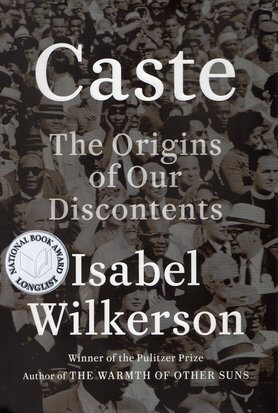A caste system endures because it is often justified as divine will, originating from sacred text or the presumed laws of nature, reinforced throughout the culture and passed down through the generations.
In Caste: The Origins of Our Discontent, American journalist Isabel Wilkerson, describes racism in the United States as an aspect of a caste system – a society-wide system of social stratification characterized by hierarchy, inclusion and exclusion, and purity. Wilkerson delves into the origins and evolution of classifying and elevating one group of people over another and the consequences of doing so to the presumed beneficiaries and to those targeted as beneath them.
She compares the experience of African-Americans and other people of color in the United States to the caste system in India and the experience of the Jews in Nazi Germany. Wilkerson explores man’s inhumanity to fellow humans based on religious dogma, eugenics, Endogamy, politics, unconscious bias, etc. She defines eight pillars that underlie caste systems across civilizations including divine will, heredity, and dehumanization.
Everything that happened to the Jews of Europe, to African-Americans during the lynching terrors of Jim Crow, to Native Americans as their land was plundered and their numbers decimated, to Dalits considered so low that their very shadow polluted those deemed above them—happened because a big enough majority had been persuaded and had been open to being persuaded, centuries ago or in the recent past, that these groups were ordained by God as beneath them, subhuman, deserving of their fate.
